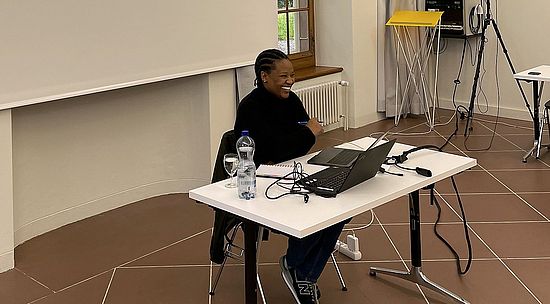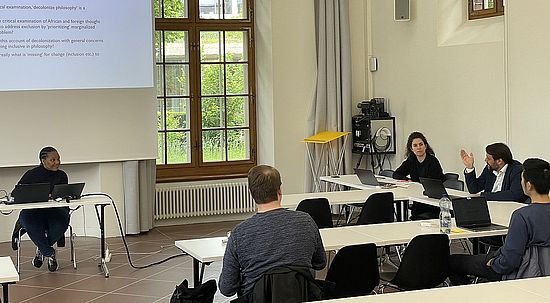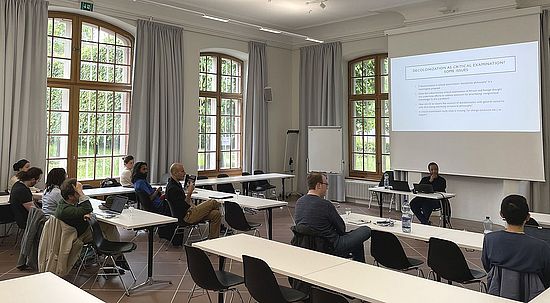/ News, Forschung, Events
Working Lunch with Lerato Posholi: “Conceptualizing Decolonization in Philosophy”



During a working lunch on 22 May 2024, Lerato Posholi gave a presentation entitled “Conceptualizing Decolonization in Philosophy”, focusing on the work of Ghanaian philosopher Kwasi Wiredu. The event was organized by the Institute for European Global Studies.
Lerato Posholi began her presentation by providing an introduction to the main ideas underpinning the discourse of decolonization in philosophy, particularly in Africa. Decolonization efforts in philosophy seek to reimagine the discipline – its key texts, its institutions, its curricula, and the field of inquiry more generally – by drawing attention to the marginalized or silenced perspectives absent from the mainstream. She then distinguished Wiredu’s conceptual decolonization from the other main variety of decolonization present in philosophy, namely the decolonial approaches of Latin American philosophers like Walter Mignolo and Ramón Grosfoguel.
Introducing Wiredu’s project of conceptual decolonization, Posholi explained how it emerged as a response to so-called intellectual colonization, namely the influence and persistence of western conceptual frameworks, including European languages and colonially inherited concepts, on African thought. In order to free African thought from the distorting effects of the foreign categories of thinking which prevail, existing conceptual schemes in philosophy must be scrutinized to allow for the accurate representation and application of indigenous concepts. Posholi identified three aspects of this process of decolonization, namely 1) exegesis (recovering ‘accurate’ African philosophies for self-knowledge and separating them from foreign influences); 2) evaluation (critically examining these philosophies for validity and truth on independent, rational grounds); and 3) construction (synthesizing African thought with whatever foreign concepts seem valuable for modern Africa).
Having set out this process, Posholi demonstrated how other scholars have responded to Wiredu by emphasizing the compatibility of his approach with mainstream philosophy. Conceptual decolonization, they argue, is essentially a form of critical examination. Posholi assessed these arguments and raised some issues regarding the extent to which Wiredu’s ideas capture the broader approach of calls for decolonization across the field. These included questioning the necessity of the “decolonization” label, distinguishing Wiredu’s approach from those typical in philosophy, and interrogating the call to address exclusion in discourse by ‘prioritizing’ marginalized knowledge. Posholi’s conclusion was that if Wiredu’s conceptual decolonization is just about critical examination, it risks losing some of the specificity of the project of decolonization as a whole.
During the lively Q&A which followed, members of the Europainstitut questioned various aspects of Wiredu’s approach, including the meaning of ‘African traditional thought’ and the risk of its essentialization. Further discussions engaged on the conceptualization of decolonization more broadly, and the need to account for the varied meanings of the concept in different fields.
The event report was written by Niamh O’Neill, Student Assistant European Global Studies
Lerato Posholi is an SNSF Fellow in the project "Reversing the Gaze: Towards Post-Comparative Area Studies" at the Institute for European Global Studies. She holds a PhD in Education from the University of the Witwatersrand, Johannesburg. Her research interests include social epistemology, decolonial theory and curriculum studies



